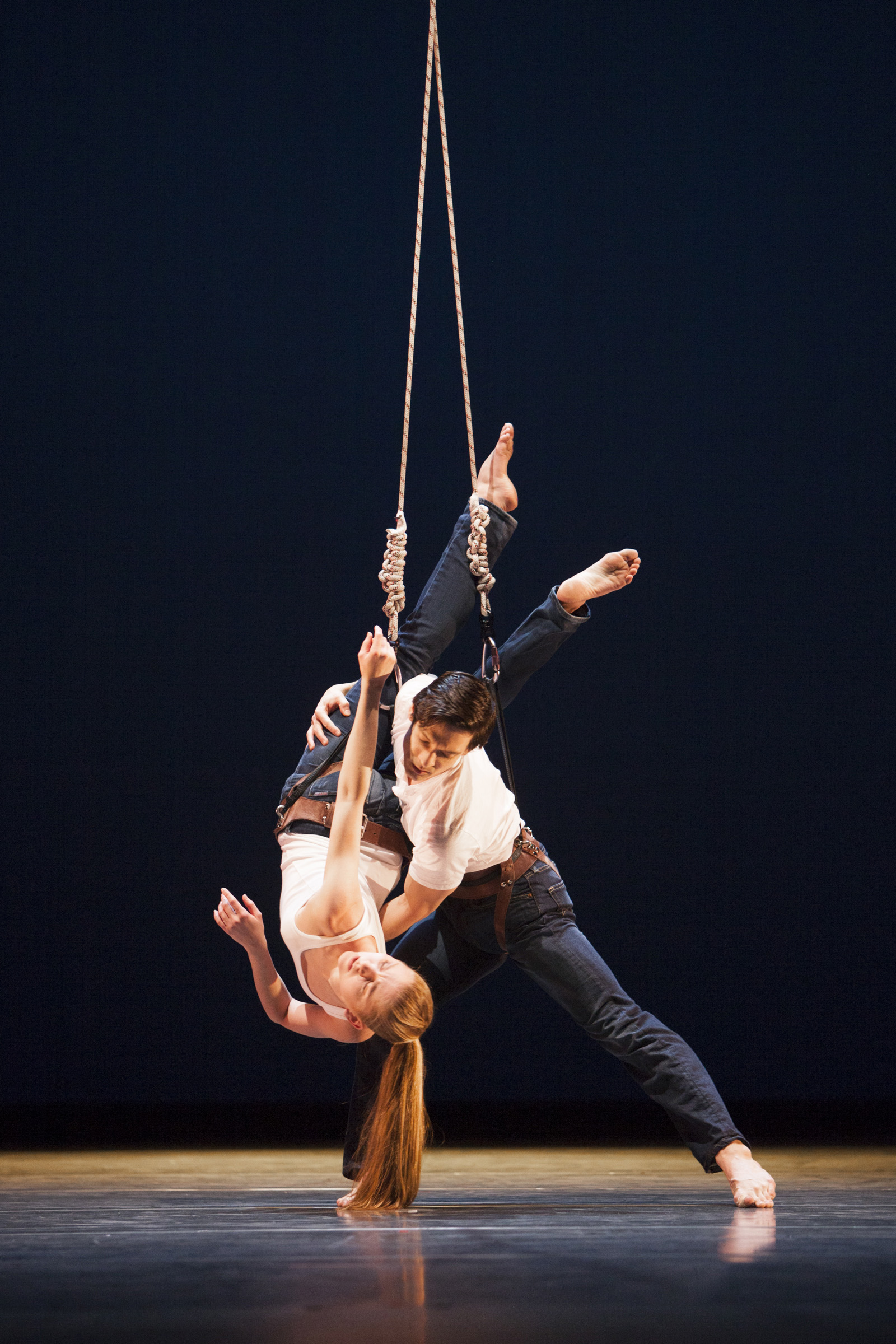Opening Nights
PDirector’s Choice
McCaw Hall, 321 Mercer St. (Seattle Center), 441-2424, pnb.org. $28–$179. 7:30 p.m. ThurS.–Sat., 1 p.m. Sun. Ends March 23.
Pacific Northwest Ballet director Peter Boal may have trained and performed at New York City Ballet, but he’s got a curiosity about dance that stretches beyond its neoclassical heritage. His picks for this year’s Director’s Choice program include Broadway and contemporary influences at either end of the evening, with a pair of postmodern works in the middle.
Susan Stroman’s Broadway-inflected TAKE FIVE . . . More or Less is a sunny opener full of stock characters: a brassy sexpot, a jazzy tap-dancer, flirty women, and snappy men. All go home happy in 5/4 time to the familiar tunes by David Brubeck and Paul Desmond. Kaori Nakamura and Angelica Generosa share the pivotal role of the woman in yellow who jump-starts the action; both bring a bright and sharp quality to the movement.
Kiss, an aerial duet by Susan Marshall, provides an eerie contrast to Stroman’s happy-ending world. Barely suspended off the floor by 40-foot ropes, Carla Korbes and James Moore glide in eccentric parabolas, sometimes swinging in tandem, other times just missing the connection. Kiss does indeed include an embrace, but it’s a darker kind of romance than sharing an old-fashioned porch swing. The two reach for each other, only to push away repeatedly. The rigging makes their relationship as much about physics as about emotion.
Just about any dance made to Igor Stravinsky’s iconic Le Sacre du Printemps would be a tour de force. Even if you don’t follow the original scenario about ritual sacrifice, just working with his ever-shifting time signatures and eccentric accents would qualify for the title. In the case of Molissa Fenley’s grueling State of Darkness, it is indeed a triumph just to dance through to the end. Fenley has created a ritualized journey for a solo performer that is both an endurance test and a meditation. Matthew Renko made a very able debut in the part opening weekend, but Jonathan Porretta, who’s danced the role before, shows the depth of his experience. He makes the stage seem small.
The program closes with a premiere: Alejandro Cerrudo’s Memory Glow is a slippery and twisty ensemble work reminiscent of Jiři Kylian, who’s been such an influence on European contemporary dance. Cerrudo seems to have lubricated the air inside McCaw Hall. Ten dancers shift in and out of relationships as they slide across the stage on stocking feet. (At one moment, Raphael Bouchard surfs halfway across the stage to arrive with a flourish, rather like Tom Cruise in Risky Business.) Partner work resembles an advanced class in knot-tying, with limbs folding and twining, only to have it all slither apart in the end. We’re left with a memory of wild activity, retreating into darkness. Sandra Kurtz
PLittle Shop of Horrors
ACT Theatre, 700 Union St., 292-7676, acttheatre.org. $20–$50. Runs Tues.–Sun. Ends June 15.
Small wonder that a show as guileless and tuneful as their 1982 Little Shop of Horrors would launch the careers of composer Alan Menken and his lyricist partner, the late Howard Ashman. It’s simple, it’s overstuffed with hummable melodies, and it toys affectionately with two of America’s enduring infatuations: cheesy monster movies and jukebox pop.
Appropriately, this co-production of ACT and the 5th Avenue cranks the fun dial up to 11 with a string of spectacular performances. These include the Spectoresque Greek chorus of Ronnette, Chiffon, and Crystal (Nicole Rashida Prothro, Alexandria Henderson, and Naomi Morgan, respectively); floral-shop owner Mr. Mushnik (Jeff Steitzer, long my favorite Scrooge in ACT’s A Christmas Carol ); and his star-crossed lovebird employees, Audrey and Seymour (Jessica Skerritt and Joshua Carter).
For such a small show, the oft-produced Little Shop has done much for both theater and film. After their smash hit moved to Broadway, Menken and Ashman helped relaunch Disney’s moribund animation division with The Little Mermaid, Beauty and the Beast, and Aladdin. Since Ashman’s 1991 death from AIDS complications, Menken has continued to enliven the art form with Enchanted and Tangled.
It’s easy to see why Ashman and Menken’s work has stood the test of time: They make story and song interdependent. Every song in Little Shop—the tale of a man-eating plant come to conquer Earth by devouring every last man, woman, and child—either advances character or plot. Often they do both. Here, director Bill Berry lets all his cast members cut loose, and none shrink from the opportunity. During both solo and ensemble tunes (arranged and conducted by R.J. Tancioco), there’s a palpable glee in watching confident performers nail each number with sharpshooter precision. Their voices blending with fearsome beauty, the girl-group trio rips the roof off with the title number. (Having seen the Off-Broadway original production, it’s interesting to hear what shows like American Idol have wrought. It’s no longer acceptable to merely sing a song—every phrase now requires performers to demonstrate their most acrobatic chops. Little
Shop ain’t so little any more.)
Parents thinking of taking their kids to see the chipper ending that delighted moviegoers in ’86 might want to reconsider. In this stage version, it’s the plant, rather than the players, who has the final word. For everyone else, Little Shop is a savory treat that reminds us that we’re all somewhere on the food chain. Kevin Phinney
E
stage@seattleweekly.com




